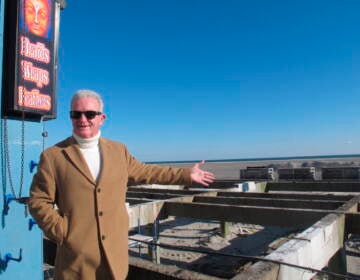New Jersey may allow building in high-risk flood zones

(Shutterstock file photo)
In the wake of Hurricane Sandy, a recurring theme emerged from officials at virtually every level of government: Rebuild the Jersey Shore — but better and smarter.
But a bill (S-2680) now sitting on the governor’s desk would allow towns to put new development on piers in high-hazard coastal areas in certain urban locations, a prospect some critics view as falling far short of achieving the goals of post-Sandy rebuilding –especially given the devastation visited upon the state’s coastal areas by the superstorm.”It’s indicative that we haven’t learned anything from the storm,” said Tim Dillingham, executive director of the American Littoral Society. “It doesn’t show any common sense at all.”
Perhaps, most importantly, the proposal might jeopardize the rest of the state’s ability to participate in a national flood insurance program, according to two trade associations of floodplain managers.
The legislation easily cleared the Senate with only two negative votes late last month and was just as handily approved by the lower house three days earlier. Sen. Nicholas Sacco (D-Hudson), its sponsor, said the bill would be beneficial to the state in terms of creating jobs and spurring the economy.
His bill would remove a restriction on allowing residential developments along waterways such as the Hudson River by the Christie administration’s adoption of new flood zone maps governing rebuilding in high-hazard areas. The municipality would have to approve a project before it could move forward.
“If we’re going to move the economy forward, we have to not limit development in these areas,” Sacco told the Senate Environment and Energy Committee this spring. “Right now, there are developments ready to go.”Other proponents of the bill argued it would have only limited application in the state, applying only to existing piers, potentially affecting only a half-dozen projects at most.
In Hudson County, Sacco noted existing developments established on piers weathered Sandy without much damage. Environmentalists, however, cautioned that with global climate change, rising sea levels are likely to pose even more dangerous conditions in the future.
“This bill will purposefully and willfully put people in harm’s way,” predicted Dave Pringle, campaign director of the New Jersey Environmental Federation.
Jeff Tittel, director of the New Jersey Sierra Club, agreed. “Just look at the roller coaster in Seaside Heights,” said Tittel, referring to the ride, which ended up in the ocean after Sandy pummeled the pier in that Ocean County community. “Do you really want a hotel and a condominium on a pier? At some point, they are going to get inundated.”
But Sen. Bob Smith (D-Middlesex), the chairman of the committee, argued that lending institutions would never finance a development with such risks.
“For good and evil, capitalism works,” Smith said. “Ultimately the institutions that will flood-proof the Jersey Shore are the banks not the DEP (Department of Environmental Protection).
But others disagreed. In a letter to Gov. Chris Christie and others in his administration after the bill won approval from the Senate, the New Jersey Association for Floodplain Management urged a veto of the legislation.
“Permitting more high-risk development is not an appropriate response to New Jersey’s flood history, now the third state in the nation with NFIP (National Flood Insurance Program) claim dollars paid at over $5 billion, including Hurricane Sandy,” the letter said.
Moreover, the association warned that the legislation may have even more far-reaching consequences, resulting in noncompliant rebuilding, jeopardizing the eligibility of every New Jersey community to remain with the NFIP.A national association agreed, calling putting projects on piers one of the most dangerous and unwise forms of development.
“For example, when the Mississippi State Legislature passed a measure that conflicted with federal requirements at NFIP, the body had to backtrack and modify its legislation to avoid endangering NFIP eligibility for the entire state,” according to a letter from the Association of State Floodplain Managers, Inc. to Christie, also urging a veto of the bill.
________________________________________________________
NJ Spotlight, an independent online news service on issues critical to New Jersey, makes its in-depth reporting available to NewsWorks.
WHYY is your source for fact-based, in-depth journalism and information. As a nonprofit organization, we rely on financial support from readers like you. Please give today.




